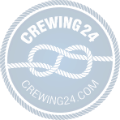
MAY 7, 20013 — Maersk Line, Limited (MLL), the Maersk Group's U.S.-flag shipping operation, has purchased and is currently reflagging eight newer and larger containerships to upgrade the ocean transportation services provided to its U.S. military, government and commercial customers.
Maersk Chicago is the former Maersk Kuantan
MLL's investment of approximately half a billion dollars in eight vessels will improve the quality of service to the Middle East and Mediterranean Sea from the U.S. East Coast. Since 2000, MLL has invested over $1.75 billion dollars to modernize its fleet in support of the U.S. government and military. The vessels are about 10 years younger than the outgoing ships, offering improved fuel efficiency and environmental performance.
"These eight newer vessels, along with the global transportation network that connects them, demonstrate our commitment to our customers. We are proud to serve the U.S. military and to deliver U.S. food aid worldwide," said John Reinhart, MLL's President and CEO. "MLL is focused on continual improvement, and these ships will further increase reliability and shrink our environmental footprint."
The vessels will join Maersk Line's weekly Middle East Container Line service (MECL1) throughout May and June. This route serves commercial customers and the U.S. military, and it transports U.S.-grown food aid. MECL1 will be the industry's only direct U.S. flag service to and from the U.S. East Coast and Pakistan, and the service includes a new stop in Algeciras, Spain.
All eight vessels will join the Maritime Security Program (MSP) and Voluntary Intermodal Sealift Agreement (VISA). "We are pleased to bring more modern and useful assets into the MSP and VISA fleets," said Mr. Reinhart. "The vessels will augment our nation's security and sustain jobs for the U.S. Merchant Marine, the fourth arm of our national defense."
"The efforts of the mariners onboard the transitioning vessels and colleagues ashore have been excellent, assuring a timely and smooth progression of the reflagging process," stated Reinhart. MLL works with four U.S. maritime labor unions to crew its fleet of 56 U.S. flag vessels and employs about 1,200 American seafarers every day.
Vessel reflagging is a complex process that involves coordination between commercial and government stakeholders. Ensuring an efficient reflagging process is critical to MLL's core business of operating and maintaining U.S. flag vessels. The coordination of 16 vessel transfers (eight in, eight out) demands expertise and alignment at all levels of the organization.
Reflagging a ship ensures that it meets the safety, environmental, operational and compliance standards required by the U.S. Coast Guard (USCG) and other U.S. maritime agencies.
MLL's engineering team performs a gap analysis on each ship to assess its compliance with USCG requirements and makes any necessary modifications. Once a vessel meets these requirements and receives all U.S. government approvals, the vessel can come under the U.S. flag, making it eligible to carry cargo for the U.S. military, other government entities and commercial shippers.
"We want to express our gratitude to the U.S. Transportation Command, the Maritime Administration, the U.S. Coast Guard, and our labor union partners," said Reinhart. "With their support, these eight ships will increase the versatility of the U.S. flag fleet. We believe that the addition of these ships, achieved through our successful cooperation, will benefit all of our customers and their vital missions."
The eight incoming vessels are named in honor of American cities that have brought industrial vitality to the U.S. economy through manufacturing, finance, transportation, and exports. This ship names are: Atlanta, Chicago, Columbus, Denver, Detroit, Hartford, Memphis, and Pittsburgh.
Maersk Chicago (6,447 TEU) was the first of the eight vessels to be reflagged; she came under the U.S. flag on May 1, 2013. She formerly served in the A.P.Moller Maersk Group's Maersk Line under the Singapore flag and was delivered from South Korean shipbuilder Hanjin Heavy Industries in 2007.
![[ad-side]](http://www.crewing24.com/ad_images/85_banner.jpg)
![[ad-side]](http://www.crewing24.com/ad_images/83_banner.jpg)
![[ad-side]](http://www.crewing24.com/ad_images/80_banner.jpg)
![[ad-side]](http://www.crewing24.com/ad_images/48_banner.jpg)
![[ad-side]](http://www.crewing24.com/ad_images/106_banner.jpg)
![[ad-side]](http://www.crewing24.com/ad_images/86_banner.png)
![[ad-side]](http://www.crewing24.com/ad_images/103_banner.jpg)
![[ad-side]](http://www.crewing24.com/ad_images/87_banner.png)
![[ad-side]](http://www.crewing24.com/ad_images/88_banner.jpg)
![[ad-side]](http://www.crewing24.com/ad_images/65_banner.jpg)